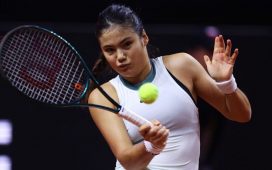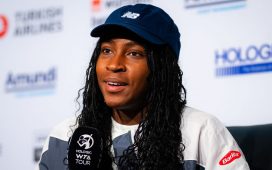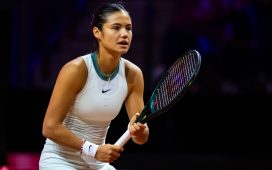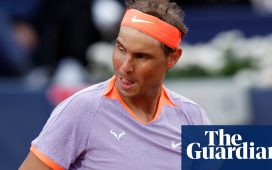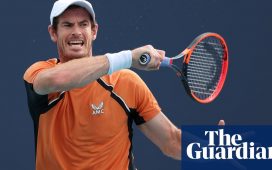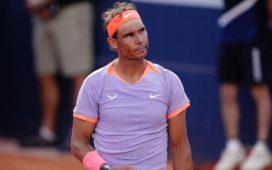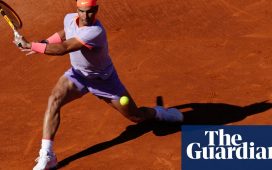A few hours after her inspired first-round victory under the US Open night lights against 2004 champion Svetlana Kuznetsova, 27-year-old American Kristie Ahn was scrolling through congratulatory messages on Instagram when one arrested her attention. It was eerie. At the 2008 US Open, Ahn was 16, ranked 758th and unknown to most when she burst unexpectedly from qualifying and into the main draw. In the first round, Ahn fell to Dinara Safina in straight sets. Eleven years later, there Safina was congratulating her on her first ever victory at a major tournament.
“It’s funny because she reached out to me [first] and was like, ‘Do you remember when we played? And I was like, ‘Do I remember? Do you remember?’” said Ahn, laughing incredulously. “She followed me. My life has gone full circle.”
After qualifying for the US Open at the first attempt, Ahn took the success as a sign that she was ready to scale to the top of the sport. Instead, she has spent most of her professional career dipping in and out of the top 200, barely making enough money to survive. For a decade, she failed to qualify for another grand slam main draw.
At the US Open this year, Ahn’s life finally changed. She’s secured the first two grand slam wins of her career by defeating Kuznetsova and Anna Kalinskaya in straight sets to reach the third round, where she will face 2017 French Open champion Jelena Ostapenko on Saturday for a spot in the second week.
“I feel like I can finally put 2008 US Open to rest,” said Ahn, sighing with relief after her first-round match. “May it rest in peace. Because I feel like, since then I have been comparing myself: ‘When I was 16, I qualied’. Wimbledon for me was absolutely massive because I finally qualified again and I no longer have to compare. It’s not that looming skeleton in my closet anymore.”
Ahn, whose parents immigrated from Korea, left her first US Open thinking that she was already prepared for the tour at 16 years old, but by 17 she was burned out. She returned to Flushing Meadows the following year with a wild card into the qualifying draw, but she didn’t want to be there. She lost in the second round and, shortly after, she would decide on a different route, enrolling in Stanford to study science, technology and society.

When Ahn graduated in 2014, she struck a deal with her parents, who agreed to fund her career between 2014 and 2017. But it came with a bitter warning: when the money ran out and she could no longer fund her career, it would all be over. She came closest to retiring in 2017 after early losses in Australia, but she surprised herself by qualifying for a WTA event in Monterey and briefly cracking the top 115 by the end of the summer.
This summer, things seem to have clicked into place more permanently. At Wimbledon, Ahn qualified for a grand slam for the first time since she was 16. It allowed her to play freely during the summer, highlighted by a quarterfinal run from qualifying to the WTA Premier event in San Jose. She puts her success down to moving from Florida, the central hub of tennis in the United States, back home to the New York area with her parents for the first time since high school. Instead of the pressure of Florida’s vast performance centers and being sequestered from her friends and family, she now strikes a balance between working and enjoying life beyond the white lines.
“I’ve become such a believer that when you’re happy outside of the court with your life then that will translate to on the court,” she said. “I looked at myself last year and I was like, I’m not happy. I don’t want to do this. I’m not planning on doing this for too long so might as well enjoy it while I still can. And I’m back home, in with the parents. God bless!”
When Ahn speaks about her career, her parents always seem to be on the tip of her tongue. Her father is an accountant who sits down with her every year to help her file her taxes, but he is also determined to see her away from the courts and into a steady job, where she could command a six-figure salary.
Her descriptions of his attempts to convince her are endless. In 2017, in the final year that her parents agreed to fund her career, he counted down the days until her retirement with a calendar. When she qualified for the US Open in 2008 and dreamed of immediately turning pro, he told her she would be going to university even if she won the tournament. Even after he watched as she defeated the 2004 US Open champion in front of a raucous crowd on Monday, just a stone’s throw from where she was born in Flushing, he was resolute.
“My dad was like, ‘So! This is a bit of a problem. How are you going to get into corporate America if you keep winning?’” she said.
Ahn’s parental stories are hilarious, told with ample sarcasm and eliciting laughter each time, but they seem to elicit a conflicted mixture of resignation and pride from her. The pressure has been intense, but despite it she is clearly prideful about chasing her dreams and carving out her own path. She feels that her success can be an example to other minorities, particularly Asian-Americans who are often taught to value their education over their own passions.
“I’m Asian, I’m a minority. It’s like, you can do it too! Regardless of your background and upbringing. Coco and Serena and Venus are locking it down out there! But for the Asian community, it’s a little bit different for us. That you can have both a good education as well as aspiring to your dreams.”
For Ahn, living her dreams means scaling the rankings and taking out former champions, but also using her opportunity to make change. As a member of the WTA player council, Ahn has backed up her words with actions and she hopes that others will take heart. “The way I look at professional tennis is like you have such a unique platform to reach kids. People put you on a pedestal so while I’m doing this I want to try and make as much of a difference as I can.”
Finally, she rolled her eyes. “And then when I’m done I can sell my soul to the corporate world.”
